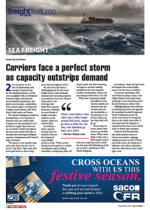In a strategic initiative aimed at consolidating its market position, Groupair is expanding its sea freight operations.According to Paul Danvers, Groupair's commercial director, this is part of the company's overarching strategy to diversify its services and enhance its capabilities in the highly competitive logistics industry.Recognising that a skilled and dedicated team is a cornerstone of success in the logistics industry, the company is proactively investing in enhancing its staff complement. This forward-thinking approach aims to ensure that Groupair's personnel are equipped with the latest industry knowledge and skills and to cultivate a work environment that fosters innovation, collaboration, and a shared commitment to the company's overarching goals, says Danvers.“In recent months, we have also brought on board new individuals who have strong backgrounds in sea freight and are well-placed to manage our sea freight product,” he told Freight News.Through targeted training programmes, talent acquisition efforts, and employee development initiatives, Danvers believes Groupair is laying a robust foundation for sustained growth, excellence in service delivery, and a competitive edge in the dynamic logistics landscape.“The importance of having strong individuals in key positions within the sea freight sector is particularly crucial, especially considering the ongoing challenges faced at South African ports,” he said. “We continue to see a lack of performance at the ports in the country, with ageing equipment that has not been adequately maintained starting to take its toll. Decision makers continue to have a reactive and not a proactive stance on the situation.”He said the backlog at South African ports was well known, and cargo was often being rerouted. “This is a concern for the future usage of South African ports. The supply chain is, and will continue to be, severely hindered – from suppliers to consumers.”Danvers added that South African port authorities needed to take drastic measures at the ports. “As it stands now, so much depends on the ability to have fully functional ports. Sea freight will always have global relevance. The authorities need to take action to ensure the relevance of its ports in the eyes of global shipping lines.”

